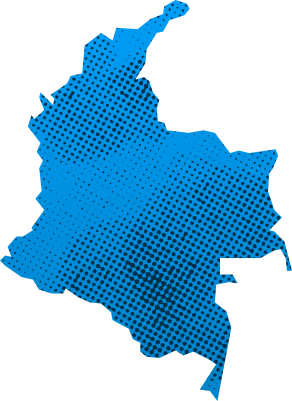
Volunteer statistics (ILO)*
Source: ILOSTATS. The data is collected by ILO from national statistical offices. As national statistics on volunteer work are produced using a variety of approaches and tools, direct and cross-country comparisons are not recommended. For more information, visit https://ilostat.ilo.org/topics/volunteer-work/
Total volunteering by gender
Direct volunteering by gender
Organization-based volunteering by gender
Measurement work
Data source
- 2007
- 2008
- 2009
-
2010
- Labour Force Survey
-
2011
- Labour Force Survey
-
2012
- Labour Force Survey
-
2013
- Labour Force Survey
-
2014
- Labour Force Survey
-
2015
- Labour Force Survey
-
2016
- Labour Force Survey
-
2017
- Labour Force Survey
-
2018
- Labour Force Survey
-
2019
- Labour Force Survey
- 2020
- 2021
- 2022
- 2023
- 2024
- 2025
- 2026
Laws, Policies, Schemes on Volunteering
Does the country have a piece of legislation on volunteering?
Ley No. 720 por medio de la cual se reconoce, promueve y regula la acción voluntaria de los ciudadanos colombianos / Law No. 720 to recognize, promote and regulate voluntary action in Colombia
Decreto 4290 de 2005 por el cual se reglamenta la Ley 720 de 2001 / Decree 4290 of 2005 by which Law 720 of 2001 is regulated
Does the country have a national policy, scheme, plan or strategy specific to volunteering?
Yes
| Name of specific policy, strategy or plan on volunteering at the national level. | Year created | Source link | What are the relevant SDG areas/crosscutting themes of the policy, plan scheme or strategy? |
|---|---|---|---|
Plan Decenal de Salud Pública 2022-2031 |
2022 | View source | |
Bases del Plan Nacional de Desarrollo 2022-2026 (Draft) |
2022 | View source |
Does the country have a sectoral and cross-sectoral policy, scheme, plan or strategy that mentions volunteering?
NoVNR Reporting
Los Ods Como Instrumento Para Consolidar La Paz
View sourceReporte Nacional Voluntario Colombia
View sourceAccelerar la implementación para una recuperación sostenible
View sourceReporting positive contribution of volunteering to the SDGs
Paragraph 1, page 137
The role of volunteering as an ally of the 2030 Agenda and the Sustainable Development Goals (SDGs): It is also important to highlight the role of volunteerism, as many civil society organizations work with people who support unpaid activities. Volunteering in Colombia is a powerful force for leaving no one behind and brings together around 800,000 people, according to the country’s national volunteering system. In this sense, volunteerism is a huge resource for solving social, economic and environmental problems. Generally, the most visible aspects of volunteering relate to service delivery in communities. People engage in voluntary work to help eliminate poverty, improve health and basic education, address environmental problems and climate change, reduce the risk of disasters, and combat social exclusion and violent conflict. Volunteering is also associated with social cohesion, solidarity, empowerment, responsibility, participation, collaboration and inclusion.
Paragraph 2, page 144
In a post-COVID-19 scenario, the 2030 Agenda should guide the global recovery, emphasizing the SDGs that have been most affected and bearing in mind that recovery strategies must include social, economic and environmental dimensions. Furthermore, given the scale of the challenge, working in partnership and seeking synergies between Governments (national and subnational), the private sector, civil society, volunteers, academia and other non-governmental actors is even more relevant.
No mentionColombia Reporte Nacional Voluntario 2024
View sourceReporting positive contribution of volunteering to the SDGs
Paragraph 1, page 132
Ficha caso de estudio Uribia ¿Se establecieron mecanismos de sostenibilidad para garantizar beneficios a la comunidad en el largo plazo? Se Consolidaron escenarios participativos como estrategia de formación y de inclusión productiva para generar cambios positivos en las comunidades indígenas, donde el conocimiento tradicional y prácticas ancestrales juegan un papel crucial sobre la soberanía alimentaria ... En el componente de agua se lograron los siguientes resultados: Modelos asociativos auto gestionados funcionando.; Circuitos cortos de comercialización establecidos; Voluntarios Multiplicadores y Líderes – Formación de formadores; Actores identificados y articulados al proceso , transferencia de conocimiento y acciones complementarias.
No mention